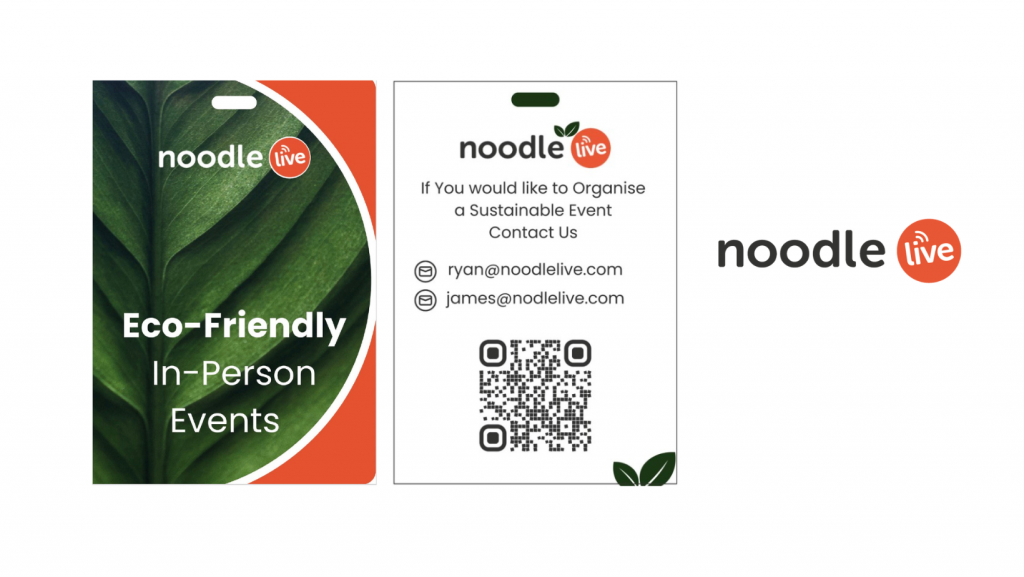Written by Nikki Cooper, Noodle Live Project Manager
Plastic V. Paper Badges – The journey towards more sustainable events
For many years plastic badges have been the choice of events spanning more than 1 day – they’re durable, waterproof, offer the best variety for printing options and branding, and above all they’re cheap. However, the plastic badge is no longer sustainable so the challenge is finding alternatives that work for event planners and budgets alike!
What do we mean by sustainable badges for events?
First, what do we mean by sustainable? Sustainability isn’t just about reducing carbon emissions, or finding completely eco-friendly alternatives, (which is virtually impossible as all manufacturing processes have environmental consequences). Sustainability is about looking at how we can apply changes to our practices and products that are less harmful to the planet than the ones we have now.
Although there are some truly innovative eco materials coming onto the market their use is limited. We spent months looking at greener badge materials but couldn’t find any that were compatible with our onsite, print-on-demand set up. Most are limited when it comes to printing and branding options, are more expensive than plastic and have an “earthy” look that a lot of clients just don’t want. So, often we’ve had to come back to plastic to provide our clients with badges that they need in increasingly short timeframes.
The Big Plastic Problem in Events
According to the United Nations only 9% of plastic globally is recycled (Nov 2023) and in the 2023 at Noodle we sold 46391 plastic badges. Now each badge weighs approximately 15 grams, which is roughly equivalent to ¾ tonne. While that might not seem a lot, that equates to almost 7 tonnes of plastic since Noodle have been in business (allowing for a couple of pandemic years). Our supplier produces 100,000’s of badges a year, which begs the question where have they all gone? How many plastic badges have you used in events over the years and where are they now?
The Problems with Plastic – a few facts
- Plastic can’t be infinitely recycled – The quality of plastic degrades every time it’s recycled so many plastics are downcycled for use in building materials or as fibres for clothing, for example. When these items reach the end of their life they will likely end up in landfill.
- Longevity – plastics can take approximately 20 – 500 years to break down in the environment, but they don’t ever disappear, they just get smaller and smaller. This means that every single piece of plastic you ever touched still exists in some form, somewhere.
- Plastic doesn’t really biodegrade – basically speaking, organic waste (food, plants, animals etc) is broken down by bacteria, fungi or microbes to be reabsorbed by the surrounding environment, ideally without causing any pollution. Plastic doesn’t. Plastic breaks down into smaller and smaller particles, microplastics, that will sit in our environment for eternity, in the air, on the land and in the sea, causing pollution. Exactly how this could impact our health is not yet fully known, however research has shown they can accumulate in human tissues.
- Plastic often contains harmful chemicals – if buried in landfill, during their very slow breakdown plastics can release harmful chemicals that are then carried into our environment through rainwater. That’s not to mention the chemicals produced from manufacturing it in the first place.
- Recycling issues – recycling plastics isn’t as straightforward as you think. There are different types of plastics, and different components within plastics, making their recycling complicated, and not all plastics can be recycled using kerbside schemes.
Noodle Live’s sustainable badge solutions
Over the last 6 months we have investigated various eco badging options, seed paper, cotton paper, bamboo, you name it we looked at it! But none of them offered all the positive attributes of plastic apart from one …. Paper.
Here at Noodle we now offer a 400gsm high quality FSC paper badge that offers all the printing options and durability of the plastic badge. It’s approximately 0.9mm thick and comes with or without an NFC chip embedded. Furthermore it can easily be recycled, even with an NFC chip. Perfect for multi-day events.
For single-day events where durability isn’t a concern, we have a thinner 180gsm option, approx. 0.3mm thick that can also be NFC enabled using a sticker, or you could use a qr code.
To remove the frustration from recycling Noodle has partnered with Terracycle to offer their Zero Waste Boxes for recycling lanyards and badges. Terracycle are leaders in recycling technologies with a mission to “Eliminate the Idea of Waste®”, working with businesses and communities across the world to encourage the move from a linear economy to a circular one.
Through the scheme we can recycle paper and plastic badges, with or without NFC chips and lanyards. The box is easy to assemble and comes with a pre-paid label. Simply take the box to your event, encourage delegates to deposit their badges in the box, then arrange for collection of your box post event.
Conclusion
With various eco-friendly badge options now available we feel there’s really no excuse to stick with plastic, but we’re not going to lie either, sustainability comes at a cost, for now at least. This is why we’ll continue to encourage our clients to think “sustainably” and move away from plastic. We’d like to create enough of a demand for paper badges that the cost comes down in the future, and if you really must insist on plastic then we’ll encourage you to at least opt for a Zero Waste Box.
Check out our Sustainability Manifesto for more information!

